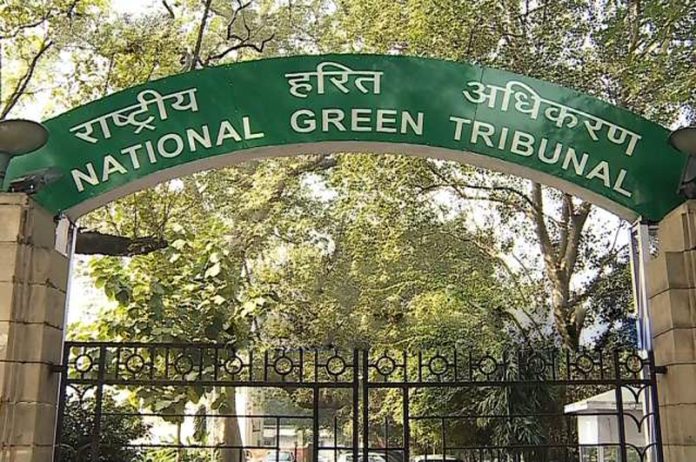NEW DELHI, Dec 31: The National Green Tribunal dealt with a wide range of environmental issues impacting our daily lives, some of which even left people gasping for breath in the national capital owing to the rising pollution levels and depleting air quality in 2024.
Other issues before the green body concerned pollution in water bodies and management of solid waste.
Various reports on controlling the rising pollution levels were filed by agencies, but the stark reality left Delhiites breathless with the onset of winter.
Dangerous levels of PM2.5 — the primary pollutant posing significant health risks — were recorded in December, with 32 of the 35 monitoring stations recording air quality in the severe-plus category, and some areas recording 470 air quality index (AQI).
The NGT however kept a close watch on the situation, directing the Commission for Air Quality Management (CAQM) to prepare a comprehensive action plan in quantifiable terms.
It ordered concerted action to curb air pollution in the NCR, and adherence to transparency in following different stages of the anti-pollution measure Graded Response Action Plan (GRAP).
The NGT issued noticed to the Centre after taking a suo motu (on its own) cognisance of a media report on a study dealing with the reasons behind “persistent air pollution” in the national capital which include emissions from thermal plants and weather conditions.
But Delhi is not the only state facing the recurring issue. As reports suggest, various other states are grappling with air pollution.
Taking note, the NGT directed 53 cities witnessing deterioration in air quality levels to submit a report on the contribution of each polluting source and measures to reduce it.
The maintenance of the pristine sanctity of venerated rivers, including the Ganga and Yamuna, particularly in the light of the upcoming Mahakumbh in Prayagraj was another concern before the green body.
The NGT issued directions to ensure the rivers were not polluted by solid waste or sewage discharge, and the water quality adhered to drinking or bathing standards at all times.
It directed the authorities to augment the number of monitoring points for rivers and the frequency in keeping a watch.
In November, the tribunal took note of a Uttarakhand government’s pollution report on River Ganga and said even the originating point of the river at Gangotri was polluted by the sewage treatment plant (STP) discharge.
The tribunal, which is monitoring state of pollution in the river and its tributaries across states, directed the preparation of a district-wise action plan and asked nodal authorities to ensure sewage was not discharged into the river or its tributaries.
For the protection of waterbodies, including, rivers, lakes and ponds, the NGT passed a slew of directions, which included adequate facilities for sewage treatment, optimum utilisation — up to the designed capacity — of the existing sewage treatment plants (STPs), a hundred per cent household connectivity with the sewerage system, compliance of the STPs with the prescribed norms and use of treated sewage water for non-potable and secondary purposes.
The tribunal dealt with matters on the issue of solid and liquid waste management and examined the compliance reports filed by states and union territories.
It took authorities to task when it ordered them to file better action-taken reports after noting discrepancies, such as gaps in waste generation and processing, remediation of legacy waste and recovery or reclamation of landfills.
In one such instance, the NGT slammed Bihar for the lack of progress on managing solid and liquid waste.
When it came to the protection of floodplains of rivers such as Ganga, Yamuna and Hindon, the tribunal asked authorities to identify, demarcate and notify the floodplain zones according to the Ganga Rejuvenation (Protection and Management) Rules.
Similarly, the tribunal underlined the importance of formulating coastal zone management plans.
In a matter concerning the depletion of green cover, the NGT outlined the need for effective monitoring and enforcement mechanisms to prevent encroachment and illegal tree felling in forests.
Preventing indiscriminate exploitation of natural resources was another serious issue before the tribunal, which asked authorities to prohibit illegal sand mining on river beds and prevent industrial activities such as stone mining and crushing in forests and ecologically sensitive areas.
The NGT heard cases on the receding groundwater levels and directed the sealing of illegal borewells, and issued directions for replenishing and preventing over-exploitation of the precious natural resource.
In a crucial step, it issued notices to 24 states and four union territories on the contamination of groundwater with arsenic and fluoride calling for “urgent preventive and protective steps”.
The tribunal took suo motu cognisance of media reports on the accidents in industrial or commercial units and directed the payment of compensation to the victims or their kin. It also imposed environmental compensation on the units that were operating in violation of the rules.
It passed directions on the management of hazardous waste, ordering proper maintenance and upkeep of treatment storage disposal facilities without its recycling through treatment or categorisation as a “by-product”.
To mitigate the problem of bio-medical wastes, the tribunal suggested ironing out of the deficiencies and asked the state pollution control boards to identify the gaps in waste generation and management, use barcodes for such waste and prohibit its mixing with municipal solid waste.
It directed the units producing electric and electronic waste to adhere to the rules on extended producers’ responsibility to deal with the issue.
The NGT said plastic waste was a menace and despite introducing single-use plastic and affixing extended producers’ responsibilities, targets regarding plastic waste management remained unattainable.
Notably, the green body directed immediate action for the restoration of Jawaharlal Nehru stadium after a “chaotic aftermath” where empty beer bottles, food packaging and other waste littered the running track after the Diljit Dosanjh concert on October 28. (PTI)
Trending Now
E-Paper


